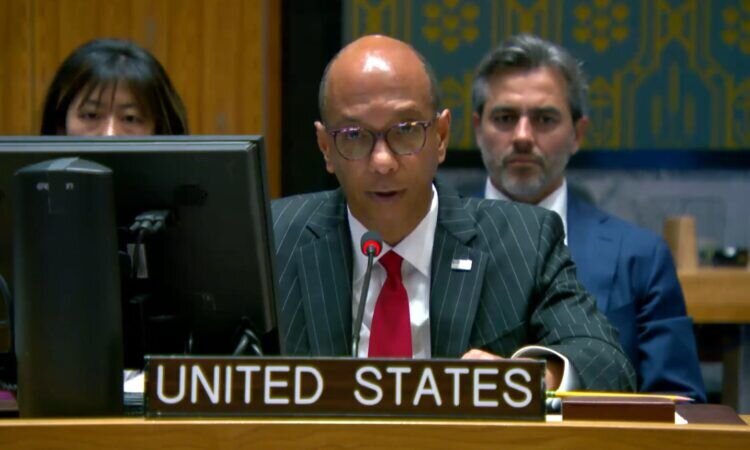U.S. pins blame on Iran over alleged arms transfer to Ansarallah

TEHRAN- The U.S. deputy ambassador Robert Wood once again accused the Islamic Republic of Iran of sending weapons to the Ansarallah forces during a Security Council meeting.
He claimed, “We must collectively hold Iran accountable for its destabilizing role and insist that it cannot hide behind the Houthis.”
Wood stated at the Security Council meeting on Tuesday that “we have repeatedly requested that the Secretary-General’s monthly report, as required by Resolution 2722, which contains information on the types of weapons used in each incident and, if necessary, their possible origin, should be presented to the Security Council.”
Despite denials of Washington’s claims by Iranian officials, the American diplomat once again claimed that “we have previously pointed to extensive evidence of Iran providing advanced weapons, including ballistic and cruise missiles, to the Houthis, which violates UN sanctions and further destabilizes the region.”
He went on add that “if the Council seeks a more hopeful outlook for Yemen, we must take collective action. We must collectively hold Iran accountable for its destabilizing role and insist that it cannot hide behind the Houthis. We once again urge Iran to stop the transfer of illegal weapons and enable the Houthis to carry out unlawful and reckless attacks.”
The U.S. Deputy Ambassador continued by saying that “we must take further steps to strengthen the enforcement of sanctions and counter those who violate them in a bid to emphasize the Council’s concern about the ongoing violation of arms sanctions.”
He claimed that “the scale and diversity of materials currently being transferred to the Houthis, contrary to Security Council resolutions, are unprecedented.”
Wood also purportedly said that “Houthi attacks lead to price hikes and create delays in the delivery and purchase of goods, food, and essential items in markets for Yemenis.”
The American diplomat added, “The United States calls on the international community to provide more financial support to reduce the humanitarian crisis in Yemen. In order to help the people of Yemen and allow the entry of necessary food and supplies into Yemen, the Houthis must stop their attacks on international ships in accordance with Resolution 2722.”
The U.S. military bases in Iraq and Syria have been targeted by drone, rocket, and missile attacks since October 17, 2023. Islamic resistance groups in the West Asia region, including in Iraq and Syria, as well as Yemeni forces, are seeking revenge for Israel’s genocide in the Gaza Strip, warning the United States that its bases in the region will be targeted.
The Yemeni army has targeted several Israeli ships or ships heading to the occupied territories in the Red Sea and the Bab-el-Mandeb Strait in support of the Palestinian people’s resistance in Gaza.
They have stated that their forces are committed to continuing the attacks until the Israeli regime stops its attacks on Gaza.
The Yemeni army has also emphasized that navigation in the Gulf of Aden and the Red Sea is free for other ships and are fully secure.
The United States and the United Kingdom, along with 8 other countries, launched an attack on Ansarallah positions in Yemen on January 21 in response to a UN Security Council resolution.
The UN Security Council approved Resolution 2722 proposed by the United States and Japan on January 20, 2024, against the group in Yemen regarding attacks in the Red Sea without mentioning the main reason for these attacks and Washington’s support for the Israeli regime’s bombardment of Gaza.
The U.S. State Department declared Ansar Ansarallah “terrorist group” on February 17 following the implementation of a new round of sanctions against them by the U.S. Treasury Department.
The administration of President Joe Biden removed the name of Ansarallah from Washington’s terrorist list in 2021 with the aim of facilitating peace negotiations in Yemen.
